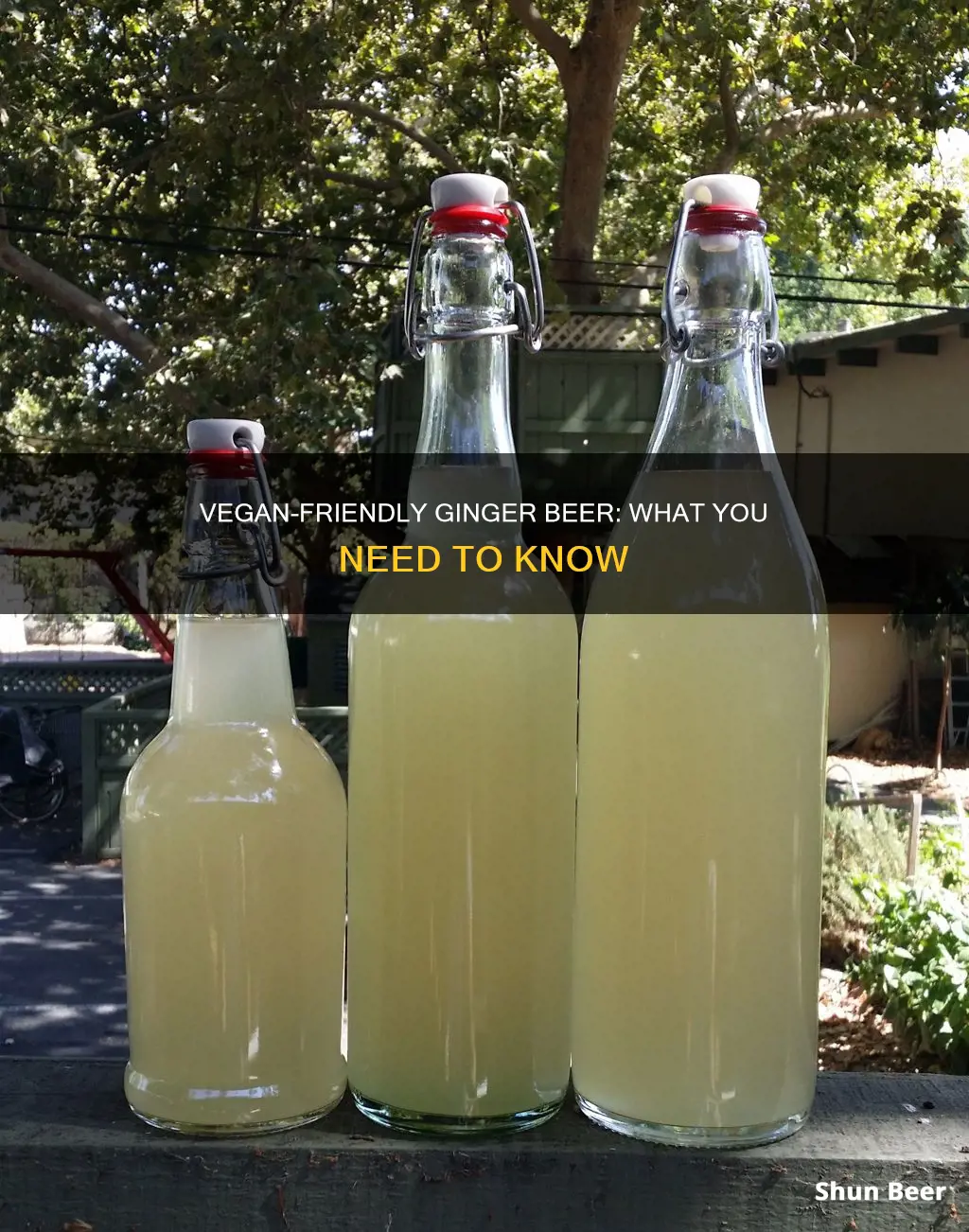
Ginger beer is a drink with a unique flavour profile – it's kind of spicy, but not really. It's made by fermenting ginger, yeast, water and sugar, and the result is a much stronger and spicier flavour than ginger ale. But can vegans drink it?
The answer is yes, most ginger beers are vegan. However, there are some brands that may contain animal ingredients, such as honey, which is made by bees and therefore not vegan-friendly. If you're ever unsure, simply check the label before you purchase.
| Characteristics | Values |
|---|---|
| Can vegans drink ginger beer? | Yes, most ginger beers are vegan-friendly. |
| Examples of vegan ginger beer | Fentimans, Stone's Ginger Beer, Farmer Willie's Craft Ginger Beer, Fentimans Traditional Ginger Beer, Fentimans Cool Ginger Beer, Nova Paka Ginger Beer, Fever-Tree Ginger Ale, Bruce Cost Ginger Ale |
| Examples of non-vegan ginger beer | Reed's Ginger Beer, Crabbie's, Buckeye Honey Ginger Beer, Matso's Ginger Beer, Sparkke Ginger Beer |
| Common ingredients in ginger beer | Carbonated water, fermented ginger root extract, sugar, pear juice concentrate, natural flavourings, cream of tartar, citric acid |
| Vegan ingredients to look out for | Carbonated water, fermented ginger root extract, sugar, pear juice concentrate, natural flavourings (plant-based), citric acid |
| Non-vegan ingredients to look out for | Ester gum, cochineal, vitamin D3, honey, refined sugar (if filtered and bleached with bone char) |
What You'll Learn

Ginger beer is vegan if it's made without animal products
Ginger beer is a drink with a long history, and it can be made in many different ways. So, it's hard to give a simple yes or no answer to the question of whether it's vegan. However, it's certainly possible to make vegan ginger beer, and some commercially available ginger beers are suitable for vegans.
The main ingredients of traditional ginger beer are ginger, yeast, water, and sugar. All of these are vegan, so the key issue is how the sugar is processed. In the US, sugar is often processed with bone char, which is made from the bones of cattle. This means that, in the US, sugar is usually not vegan. However, outside of the US, bone char is rarely used to process sugar, so ginger beer made with sugar is more likely to be vegan.
Another potential issue is the use of honey. Honey is not vegan, and it can sometimes be included in ginger beer, as in the case of Reed's Ginger Beer. However, this is relatively uncommon, and most ginger beers do not contain honey.
Some people also consider natural flavors to be non-vegan, as they can be derived from animal products. However, this is not a common issue with ginger beer, and most natural flavors are plant-based.
So, in general, ginger beer that is made without animal products, such as bone char-processed sugar, honey, or animal-derived natural flavors, is suitable for vegans. It's always a good idea to check the ingredients and do some research before consuming any product if you're unsure about its vegan status.
Beer and Ulcerative Colitis: What You Need to Know
You may want to see also

Some ginger beers are fermented with yeast
Ginger beer is traditionally made by fermenting ginger, sugar, and water. This process was first developed in Yorkshire, England, in the mid-18th century. The result is a much stronger and spicier flavour than ginger ale.
The fermentation process involves combining ginger syrup, lemon juice, and yeast in a bottle or jar. The mixture is then sealed and left to ferment at room temperature for several days, allowing carbonation to develop. The fermentation time can vary depending on the type of yeast and temperature, with warmer environments speeding up the process.
While it is possible to use store-bought yeast, such as active dry yeast, some people prefer to use a ginger bug—a wild-yeast culture made from sugar and ginger—to ferment their ginger beer. This method takes longer but results in a traditional, non-alcoholic beverage.
For those who prefer their ginger beer with a kick, using commercial brewing yeast will result in a higher alcohol content. However, this is a different recipe and process altogether.
Beer and Pizza: A Match Made in Heaven?
You may want to see also

Ginger beer can be made at home
Ingredients:
- 1 cup granulated sugar
- 2 tablespoons grated fresh ginger
- 1/8 teaspoon active dry yeast or brewer's yeast
- 3 tablespoons lemon juice, freshly squeezed
- 7 cups filtered water
You will also need: a clean 2-liter soda bottle, funnel, saucepan, fine strainer or coffee filter, and a grater.
Method:
- Combine the sugar, grated ginger, and water in a saucepan over medium heat. Stir until the sugar is dissolved.
- Turn off the heat and allow the mixture to steep for an hour.
- Strain the mixture (discard the ginger solids) and allow it to cool. You now have ginger syrup!
- Place a funnel in the top of the bottle. Sprinkle in the yeast, followed by the syrup, lemon juice, and water.
- Put the lid on the bottle and shake until the yeast is dissolved.
- Store the bottle in a shady place or pantry, out of direct sunlight, for 2-3 days. The drink will be ready when it's fizzy.
- Refrigerate the bottle to prevent further fermentation and consume within 1-2 weeks.
Tips:
- Be sure to open the bottle every day to release the extra gas, or it may explode!
- You can adjust the amount of ginger and lemon juice to your taste.
- For a non-alcoholic version, skip the fermentation process and mix the ginger syrup with seltzer water instead.
Beer and Heart Failure: What You Need to Know
You may want to see also

Ginger beer is a good mixer for cocktails
Ginger beer is a popular mixer for cocktails. Its versatility makes it an excellent choice for a wide range of spirits, including rum, vodka, and gin. The intense ginger flavour and fizziness of ginger beer add a unique, zesty kick to cocktails.
One of the most famous ginger beer cocktails is the Moscow Mule. This cocktail is made with vodka, lime juice, and ginger beer, and it's known for its bubbly, zingy, and bold flavour. The Moscow Mule belongs to a family of cocktails called a buck, which combines liquor, ginger ale or ginger beer, and citrus juice.
Another popular cocktail that uses ginger beer is the Dark and Stormy. This drink is similar to the Moscow Mule but uses dark rum instead of vodka. The bolder flavour of dark rum pairs perfectly with the full-bodied ginger beer.
For whiskey lovers, the Whiskey Highball is a simple yet intriguing cocktail. It has two variations: one with soda water and the other with ginger beer, adding a balanced twist to the classic drink.
The Pimm's Cup is another excellent choice for a ginger beer cocktail. This British mixed drink combines Pimm's No.1, cucumber slices, and ginger beer for a bubbly and fruity flavour.
If you're looking for something more exotic, the El Diablo is a unique cocktail that combines tequila reposado, crème de cassis, lime juice, and ginger beer. The bold berries, zingy lime, and spicy ginger complement the tequila, creating an unforgettable flavour profile.
With its intense ginger flavour and fizziness, ginger beer adds a delightful twist to any cocktail. Its versatility allows it to be paired with various spirits, making it a perfect choice for mixology enthusiasts.
Beer and Covid 19: What's Safe to Drink?
You may want to see also

Ginger is a flowering plant native to south China
Ginger, or *Zingiber officinale*, is a flowering plant native to the humid, partly-shaded habitats of moist tropical and subtropical forests in Maritime Southeast Asia. It is a herbaceous perennial plant in the large ginger family, *Zingiberaceae*, which also includes turmeric, cardamom, and galangal. Ginger is characterised by its narrow leaves and annual pseudostems, which are false stems made of the rolled bases of leaves. The inflorescences bear flowers with pale yellow petals and purple edges, which arise directly from the rhizome on separate shoots.
Ginger is a true cultigen and does not exist in its wild state. It is believed to have originated among the Austronesian peoples, who likely domesticated it and transported it throughout the Indo-Pacific during their expansion around 5,000 years ago. Ginger was one of the first spices to be exported from Asia, reaching Europe with the spice trade and becoming popular in the Middle Ages. Today, it is widely cultivated and can be used fresh, dried, ground, or preserved in brine, vinegar, or sugar syrup.
Ginger grows best in warm, humid environments, at elevations between 300 and 900 metres, and in well-drained soils. It thrives in rich, moist, and well-drained soil and prefers temperatures above 50 degrees Celsius. The plant is a heavy feeder and benefits from regular fertilisation. Ginger is typically harvested between four and ten months after planting, depending on the intended use. The size of the ginger rhizome is essential to production, as larger rhizomes result in faster growth and market readiness.
Ginger has a diverse range of uses, including culinary, medicinal, and ornamental applications. It is commonly used as a spice and folk medicine, adding a spicy punch to various dishes, teas, and baked goods. In addition, ginger is used in traditional medicine in China, India, and Japan, and as a dietary supplement.
Understanding Beer Bikes: How Do They Work?
You may want to see also
Frequently asked questions
Yes, ginger beer is vegan. Ginger beer is made by fermenting ginger, yeast, water, and sugar. Some modern non-alcoholic ginger beers are carbonated versions that tend to contain real ginger and ginger extract.
Ginger beer and ginger ale are made differently. Ginger beer is made by fermenting ginger, yeast, water, and sugar. Ginger ale is carbonated water flavoured with ginger.
Some vegan ginger beer brands include Fentimans, Stone's Ginger Beer, Farmer Willie's Craft Ginger Beer, and Fentimans Traditional Ginger Beer.
Yes, you can make your own vegan ginger beer at home. You can find many recipes online, and some may include additional ingredients such as lime or mint for added flavour.







